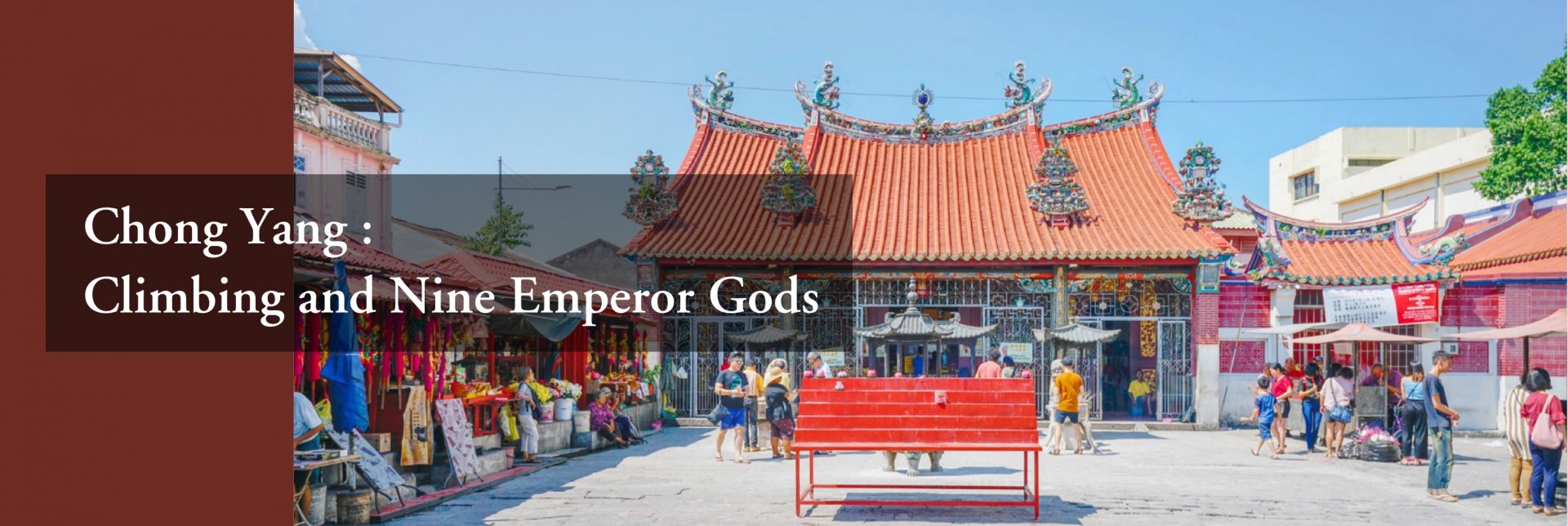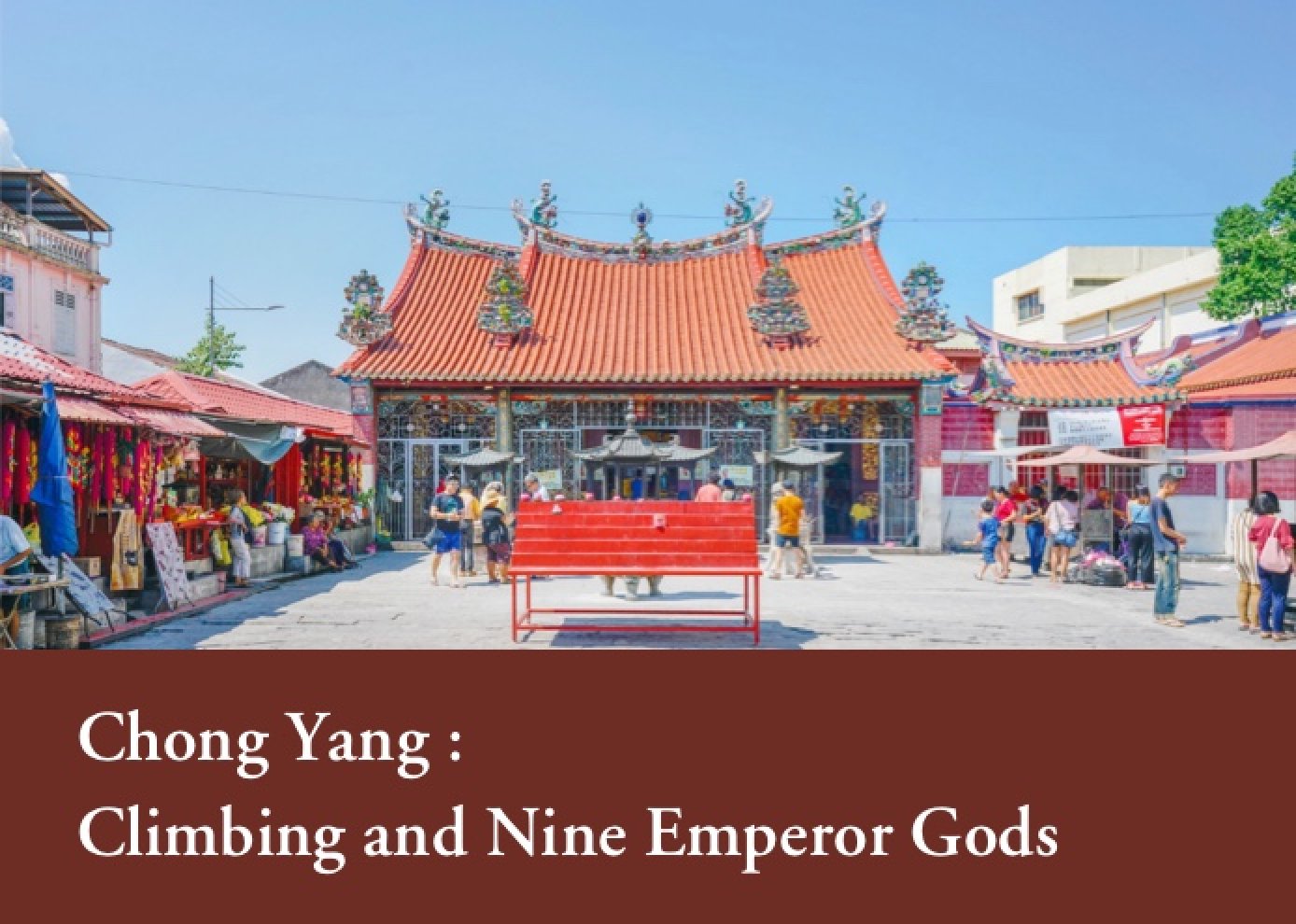Chong Yang: Climbing and Nine Emperor Gods
Wang Wei (王維,692-761) ’s poem Thinking of my Brothers on Mountain Climbing Day (〈九月九日憶山東兄弟〉) is well known among Malaysian Chinese, they know climbing is the custom of the Chong Yang Festival (重陽節), the ninth day of the ninth month in Chinese Calendar (農曆九月初九), but by contrast, they attach more importance to the Ceremony of Nine Emperor Gods Festival (九皇大帝誕辰香會), which was the annual event of Malaysian Chinese.

Yu Lan Festival (盂蘭節,又稱中元節) and Mid-Autumn Festival (中秋節) in the seventh and eighth month of Chinese Calendar are all the important festival of Chinese people. At the end of the eighth month of the Chinese Calendar, people start to prepare for the Nine Emperor Gods Festival which will last more than ten days. Jiu Huang Da Di (九皇大帝) and Jiu Huang Ye (九皇爺) are all the names of Nine Emperor Gods, there is no general agreement of the origin and appellation about the festival and gods. There is a saying, the belief of Nine Emperor Gods was source from the belief of Big Dipper (北斗信仰) and the folkloric version of it, as all the temple which worship the Nine Emperor Gods were called Dou Mu Palace (鬥母宮 ,Dou Mu 鬥母 is the goddess of Taoism, who is the mother of the Big Dipper). In this way the Ceremony of Nine Emperor Gods became the homeland image of Malaysian Chinese, just like the scene which described by the poem “I look for the orientation of my hometown by the place of the Big Dipper in every night” (每依北斗望京華)
In addition, the Ceremony of Nine Emperor Gods Festival with unique form and the element of secret society – Greeting the God on the Sea (海上迎神) and See off the Ship of Gods (送皇船), in most cases, the Nine Emperor Gods without the concrete images. Only the core members of the believers are allowed to enter the sacred space (a specific area) during the ceremony, the general believers can only participate the ceremony outside the sacred space, hence the current opinion believed that the belief of Nine Emperor Gods was related to the consciousness of adherents of Ming Dynasty - against the rule of Qing Dynasty, they believe the Ceremony was source from the anti-Qing activities of the Heaven and Earth Society (天地會) and mixed with the form of Big Dipper Belief and the worship of Wang Ye (Wang Ye, 王爺, in Chinese Worship refers the Male God), the members utilized the chance of annual folk ceremony to discuss the plan to overturn the governor of Qing Dynasty.
The Ceremony of the Nine Emperor Gods Festival will last over ten days, from the first day of the ninth month to the birthday of the Nine God Emperor in the Chinese Calendar. The devout believers will abstain from meat in the last day of eighth month of Chinese Calendar until the end of the Ceremony, this custom called as “Xi Fu” (洗腹), the believer can keep on the vegetarian diet during the last three day or even the last day of the Ceremony, then worship in Dou Mu Palace. The Nine Emperor Gods Belief believe if the believers do not observe the discipline and worship the gods, they will displease the gods and bring misfortune. The Nine Emperor Gods Vegan (九皇素) refer to the vegetarian dishes without eggs. The families which keep the diet of the Nine Emperor Gods Vegan, prepared the appropriate kitchen wares and table wares which were only used during the Ceremony to keep the purity of belief in earlier years. After the 1990s, with the development of the economy, people can easily find stalls which provide the Nine Emperor Gods Vegan in the ninth month of the Chinese Calendar. These stalls are always with yellow banner as the representative colour of the worship is yellow and the colour of deacons’ clothing is white and yellow (There is a saying that the yellow and white clothing is the mourning for Ming Dynasty).

Climbing up is the custom of Chong Yang Festival, but in Penang, there are some differences. In the central part of Penang, there is a Qing Guan Temple (清觀寺) which worship the statue of Nine Emperor Gods and a Dou Mu Palace stand on the hill. The period of the Ceremony of Nine Emperor Gods is the peak time for worship every year. The believers climbed the stone step which called as “Thousand Stairs” (千二層) to worship in the early years. After 1990s, Kek Lok Temple of Crane Mountain (鶴山極樂寺) became the popular place for worship, as there was a road led to the temple in the mountains, which allowed elders take the jeep to pilgrimage.
In the ninth month of the Chinese Calendar, the students and examinees will face the final examination and entrance examination. To relax the mind and body, they will invite their friends to climb up together and worship for a good score. The Qing Guan Temple which is located in the central part of Penang has over 100 years history, the believers and worship created a series of sceneries and a unique custom in Chong Yang Festival.

In the culture of South Asian Chinese, there is a close tie between Chong Yang Festival and the Ceremony of Nine Emperor Gods Festival, but even the ancestors of the South Asian Chinese did not have a clear understanding of the history of development between these two festivals. And the customs were passed down and brought up the cultural landscape of Chinese in Malaysia and Thailand. In the last day of the eighth month in Chinese Calendar, the deacons will greet the god with boat in the sea, and in the night of the ninth day of the ninth month in Chinese Calendar, the Dou Mu Palaces and the Palaces of Nine Emperor Gods (九皇殿) around the world will organize the farewell ceremony to the gods, which similar with the Wangchuan Ceremony (送王船儀式) in the worship of Wang Ye.
The belief of Big Dipper, the anti-Qing dynasty secret society, the worship ceremony, belief disciplines and the custom of climbing up in Penang all the elements blend into the Ceremony in the ninth month of South Asian Chinese and reflects the complex history behind it.
All articles/videos are prohibited from reproducing without the permission of the copyright holder.




Welcome to leave a message:
Please Sign In/Sign Up as a member and leave a message